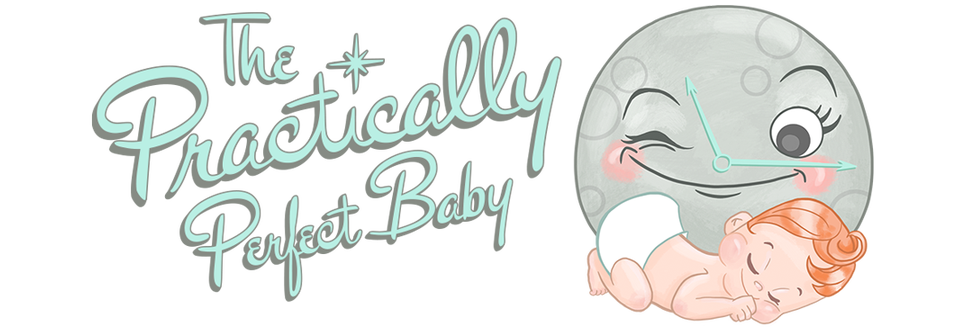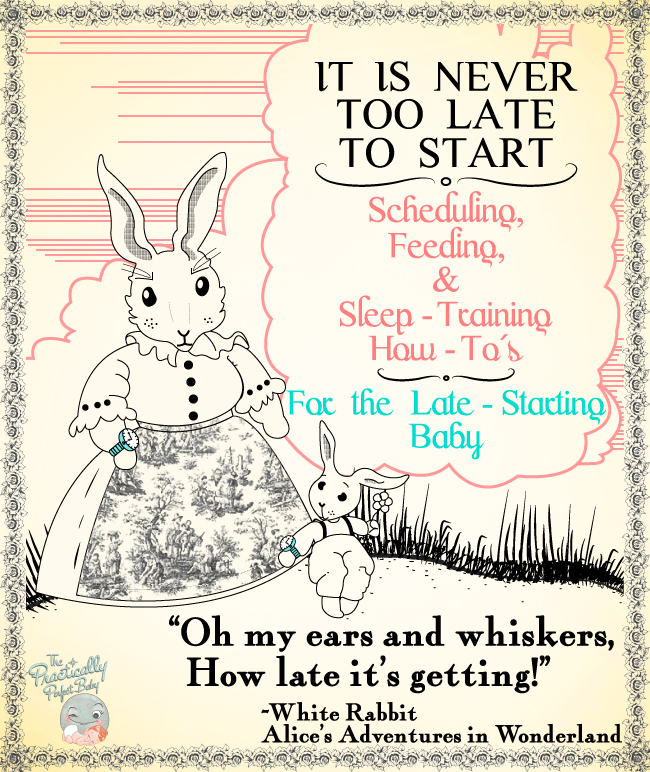Getting a Late Start Scheduling and Sleep Training Your Baby
Sleep coach and postpartum doula, Shannon Hernandez, offers her expertise for getting a late start scheduling and sleep-training your baby, using our Practically Perfect Baby Schedules.
It’s Never Too Late to Start Getting Better Family Sleep!
Having spent the last twelve years of my life up-close and personal in the homes of everyday parents who are struggling to make it through each day with the staggering effects of sleep deprivation, I can assure you that it is never too late to bring sleep back into your life. As a sleep coach, postpartum doula, and mother of four, I’d love to help you get started scheduling late and then help you stay successful until your child is sleeping through the night – every night, in his own crib, in his own room. After all, that is the long term goal: good sleep for the whole family!
There are obvious benefits for you to sleep well (like having enough energy to take a shower!) but something else amazing happens when you follow a consistent schedule: you teach your child’s body (and sometimes yours too) how to self-regulate! That is a monumental advantage to your child throughout his life. As parents, we build our child’s world and if we can teach our children how to fall asleep and stay asleep, that becomes the forefront of their emotional awareness and personality development — how awesome is that!? Helping your child to self-soothe and to find ways to be an independent sleeper at an early age can change the way they deal with and manage stress, give them confidence in their own ability to problem-solve, and provide them with the healthy attachment they need to have a head start in this game called life.
So Let’s Get Started Now:
1. Create a Sleep Plan
First, make sure your baby’s health is capable of following a chosen schedule late. For example, a baby that suffers from acid reflux and is not getting enough calories down during the day can’t suddenly be expected to tolerate night weaning. But when you and your pediatrician are sure you’re both completely ready to start, customize your own sleep plan by choosing the right PPB schedule and then begin to blend it into your baby’s lifestyle. Generally, I would advise starting one schedule behind the schedule you would have been using, had you started using one for your baby from the beginning. And then ideally, you will use that schedule for 3-4 weeks before moving on to the schedule that corresponds to your baby’s actual age in weeks. The point is to have complete success with the first schedule before moving on to the next one. But it’s also important to be realistic and patient and allow for more time with the first schedule if your baby isn’t thriving with it. Remember, it’s a big change for your baby, you, and your partner!
Tip: Reading about the benefits of sleep for your baby and your family can also help you keep perspective and stay motivated throughout the transition you’re all going through. Start by reading these PPB posts: Why Use PPB Schedules, The Nursery Night One, and Sleep Training Must: the 15 Minute Rule.
2. Get Support in Place
There’s always something that makes parenting more stressful than it should be, right? Any parent lacking enough support will eventually realize they really need it. Anticipate that you won’t have enough of it and get some however you can. Ask your partner, parents, siblings, friends, or for goodness-sake, go out and hire someone! The level of support you’ll need when you’re administering a new schedule for your baby will vary. For some of my clients, just checking in with me when they have questions is enough, and for others they need me to physically be there and model for them in their home. But the bottom line is that if you run out of gas, you’re not going to make it to sleepy town, so plan for the support you think you’ll need before you even start.
Tip: Using a sleep coach has become an invaluable resource for many parents. You can most likely find a reputable one in your area by searching online and of course you can always contact my team by visiting http://dreamteamdoulas.com.
3. Be Consistent
If there is one sleep-training disaster I see most, it’s a lack of consistency from parents. And yet, any child development professional will tell you that consistency is the key to successful parenting at any age. The problem usually lies in the fact that in our society, we demand results and we demand them yesterday! So if that sounds like you, you’re going to have to remind yourself that this will take time and commitment to get the results you want for your family. It’s totally worth it — so get ready for the long haul and make sure that you and your partner are committed to being consistent by following through as a team with the schedules. Otherwise, it can end up being confusing to your child and completely exhausting and frustrating for everyone.
If you go backwards on your plan, expect that your baby will regress in his sleep patterns too. This regression happens most often when parents feed their babies when they awaken during the night after they have already started weaning and adjusting to their longer nighttime stretches of sleep. Parents mistakenly feel that giving their baby more food in the middle of the night is the fastest way to get themselves and their baby back to sleep. Unfortunately, it ends up being very temporary and actually works against what you’re trying to accomplish. Use PPB’s Sleep Training Must: the 15 Minute Rule instead so you can stay as true to the schedule as you can; it’s truly what makes or breaks sleep-training.
Tip: Don’t underestimate the power of “Baby Brain!” Print out and use PPB’s Scheduling Logs to help you stay consistent by keeping track of where you are in your baby’s new schedule.
4. Be Ready for the “Game Changers”
There are some obvious setbacks that can occur and will have nothing to do with how consistent you are with the new schedule. When normal events like teething, vaccinations, vacations, viruses, or growth spurts come into play — it’s important to give your child the extra love and attention he needs and to recognize that success with the new schedule isn’t as important as getting your baby through the event you’re facing. For example, if a fever is present, dehydration is a risk and adding a feeding or two at night may need to be temporarily incorporated into the schedule.
And growth spurts can be exceptionally confusing if they happen to occur during your sleep-training because they require extra calories as well, but are harder to recognize at first. During a growth spurt, know that it’s an internal, neurological issue. I see parents start changing the schedule around or abandoning it altogether because they are not sure what else to do, but I advise you not to mess with it! The best thing to do when your baby is experiencing a growth spurt is to stay consistent to the new schedule, but to offer more milk or formula at each scheduled feeding to provide him the extra calories his body needs to get through it. Eventually his mind will re-regulate his body and if his body is on a consistent schedule during this process, even with interruption or regression, it will be a seamless transition once your baby’s development has completed the spurt.
Tip: Read PPB’s post on Growth Spurts to help you understand them more, what to expect during them, when to expect them, and how to help your baby through them.
Related Posts: PPB Scheduling Logs, Baby Playtime Activities,Swaddling, The PPB Story, Sound of Magic, Crib Essentials, Nursery Organization Must-Haves, Crib Soothers, Magical Bedtime Routine,Self-Soothe & Self-Play, 1st Year Baby Sleeping Milestones
Shannon Hernandez is the founder of www.dreamteamdoulas.com. She is a postpartum doula, sleep coach, and mother of four.















